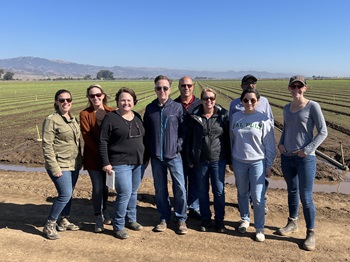By Ashley Eisenbeiser, MS, CFS, Senior Director, Food and Product Safety Programs, FMI

If you ask FMI members what the most valuable benefit of FMI membership is, many will say they value the community and the ability to network and collaborate with peers. In fact, according to our most recent member satisfaction survey, industry collaboration is the most cited reason for joining FMI, with 75% saying it’s a major reason they joined. That is definitely true for the food safety community. FMI’s Food Protection Committee (FPC) has demonstrated the impact that true collaboration can have. For decades, members of the FPC have worked together for the common purpose of protecting public health, and through collaboration, the FPC has developed solutions to address the biggest challenges facing the retail and wholesale industry.
Each year, the FPC sets initiatives to help guide and prioritize their work. Not only do these priorities help to focus our communication with member companies about pressing food safety issues, they also direct our efforts with Congress and regulatory agencies on federal food safety policies. The 2023 Food Safety Priorities are:
Traceability
Food traceability plays a critical role in foodborne illness investigations and retailers have various systems in place to help identify products at different points in the supply chain. In November 2022, FDA published the Final Food Traceability Rule, “Requirements for Additional Traceability Records for Certain Foods,” which establishes traceability recordkeeping requirements for persons who manufacture, process, pack or hold foods included on the Food Traceability List or foods that contain listed foods as ingredients. The path toward compliance isn’t going to be easy. The industry is faced with many challenges - the final rule is complex, the scope of the Food traceability list (FTL) is vast and broad, and the regulatory requirements conflict with operational practices. Regardless, the food industry must navigate the challenging landscape and meet the requirements of the rule by the January 20, 2026 compliance date. This year, the FPC will work to gain greater clarity about the rule and will begin to develop tools and solutions to help the industry move toward compliance.
New Era of Smarter Food Safety Initiative
The grocery experience is evolving. In addition to rapid technological advances both at the operational level and as part of the customer experience, the industry continues to see a shift in how shoppers purchase their food, how shoppers prepare food and the type of foods shoppers are eating. Despite these changes, food safety must remain a priority. Published in July 2020, FDA’s New Era of Smarter Food Safety blueprint represents FDA’s 10-year plan and outlines the approach the agency plans to advance food safety. The blueprint looks to both the public and private sectors and how they, in partnership, can work to identify and implement solutions that will help achieve the shared goal of protecting public health. While the New Era framework covers a wide array of issues, FMI will focus our efforts on recall modernization; coordination between various federal, state and local government agencies with the industry on foodborne illness investigations; and developing food safety best practices for newer business models including ecommerce and delivery.
Produce Safety
Produce safety remains a priority for retailers and wholesalers, and FMI members are committed to using science to drive policies and standards. With the devastating flooding that occurred in California recently, the industry is concerned about the potential for an increased risk of contamination as the leafy greens growing season approaches. These types of situations emphasize the importance of having science-based standards in place to reduce the risk of produce contamination.
FMI members will continue to collaborate with the produce industry, regulatory officials and scientists to advocate for more research, identify root causes, implement preventive measures, enhance supplier and grower food safety programs and develop resources to help ensure the food industry has strong food safety programs in place to prevent contamination and enhance the safety of fresh produce.
FMI members are committed to continuous food safety improvement. Working together, members of the FPC will address the 2023 Priority Initiatives by developing solutions, programs and materials that will make a measurable impact in retail food safety.


 Industry Topics address your specific area of expertise with resources, reports, events and more.
Industry Topics address your specific area of expertise with resources, reports, events and more.
 Our Research covers consumer behavior and retail operation benchmarks so you can make informed business decisions.
Our Research covers consumer behavior and retail operation benchmarks so you can make informed business decisions.
 Events and Education including online and in-person help you advance your food retail career.
Events and Education including online and in-person help you advance your food retail career.
 Food Safety training, resources and guidance that help you create a company food safety culture.
Food Safety training, resources and guidance that help you create a company food safety culture.
 Government Affairs work — federal and state — on the latest food industry policy, regulatory and legislative issues.
Government Affairs work — federal and state — on the latest food industry policy, regulatory and legislative issues.
 Get Involved. From industry awards to newsletters and committees, these resources help you take advantage of your membership.
Get Involved. From industry awards to newsletters and committees, these resources help you take advantage of your membership.
 Best practices, guidance documents, infographics, signage and more for the food industry on the COVID-19 pandemic.
Best practices, guidance documents, infographics, signage and more for the food industry on the COVID-19 pandemic.
